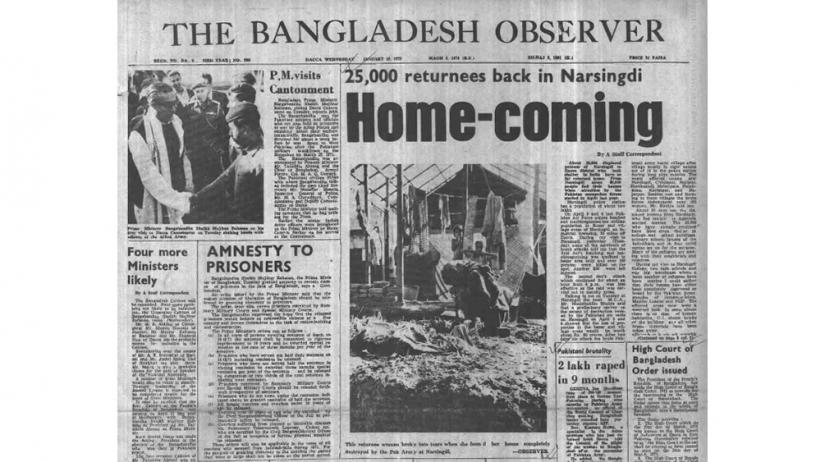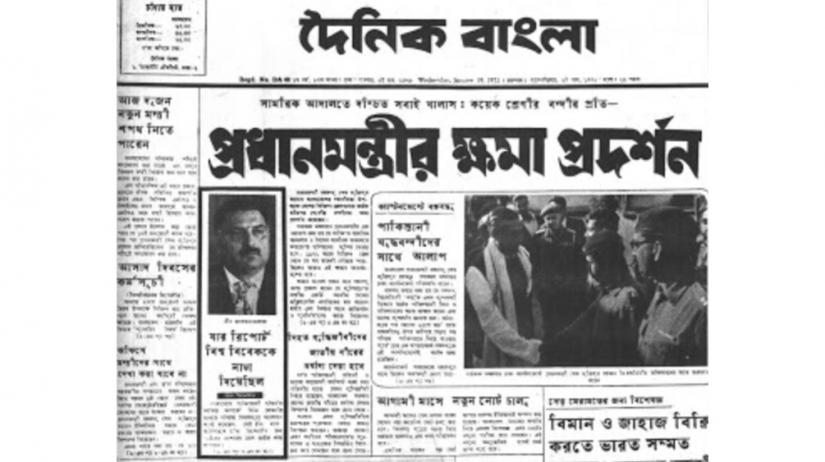 On Mar 25, 1971, the Pakistani army confined Bangabandhu Sheikh Mujibur Rahman for a week in the Cantonment. Almost a year later on Jan 18, the Father of the Nation visited the Cantonment and a decision to free prisoners convicted in the military law.
On Mar 25, 1971, the Pakistani army confined Bangabandhu Sheikh Mujibur Rahman for a week in the Cantonment. Almost a year later on Jan 18, the Father of the Nation visited the Cantonment and a decision to free prisoners convicted in the military law.
According to an order issued on this day, those convicted in temporary and special military courts will be granted pardon including those who escaped in 1971.
Bangabandhu, who was serving as the prime minister expressed hope that the pardoned convicts would behave as responsible citizens of an independent Bangladesh.
During his visit to Cantonment on Jan 18, Bangabandhu exchanged greetings with the soldiers who were arrested by Mitro Bahini (the allied forces) during the War of Independence. According to a BSS report, he spoke to each of the prisoners individually.
On this day Rajshahi University Central Student Union, Bangladesh Chhatra League and a delegate of fourth-grade employees visited Bangabandhu on Jan 18.
Addressing the youth, an emotional Bangabandhu called on them to reconstruct the roads and bridges and told them they would build the ‘Shonar Bangla’ of his dreams.
On Mar 25, 1971, after a meeting between Bangabandhu and Yahya Khan the Pakistan army had conspired to kill him, he had told a Press Trust of India correspondent in an interview.
He said that he was warned of the conspiracy by a close aid whose name he never revealed. “That night they wanted to kill me and publicise that I was murdered by political opposition.”
“I had two paths ahead of me; to go out on the streets to fight or stay in the house to wait for death. I chose to prepare the latter because I knew that it would reveal the true faces of the Pakistan army,” he had told the reporters.
In an interview with Eastern News Agency (ENA) back then, Dr Kamal Hossain said that drafting of the Constitution would soon be complete and would reflect the people’s demands and fruition of Awami League’s manifesto. In an interview with Russian news agency TAAS, Bangabandhu thanked the Soviet Union for supporting Bangladesh’s struggle for freedom and for their support in the United Nations Security Council.
In an interview with Russian news agency TAAS, Bangabandhu thanked the Soviet Union for supporting Bangladesh’s struggle for freedom and for their support in the United Nations Security Council.
As prime minister, Bangabandhu fixed the visit timings both for the prime minister and the Cabinet members. In the order, ministers cannot be visited during office from 9 am to 3 pm. He also fixed the timing for the visit to the prime minister’s office from 9 am to 10 am and 5 pm to 6 pm at his own residence.
On Jan 18, 1972, the Bangladesh High Court order was issued saying that it would open the next day. The then chief justice Abu Sadat Mohammad Sayem administered the oath to five justices.
Several decisions were made after the month of victory was over. The government decided to confer the title of national hero to the martyred intellectuals. It was announced that the government is about to draft the labour laws and work for a people-oriented education system was also underway.
 National
National
41252 hour(s) 52 minute(s) ago ;
Afternoon 03:47 ; Tuesday ; Jul 01, 2025
Jan 18, 1972: Bangabandhu’s visit to Cantonment
Send
Udisa Islam
Published : 23:27, Jan 18, 2020 | Updated : 23:30, Jan 18, 2020
Published : 23:27, Jan 18, 2020 | Updated : 23:30, Jan 18, 2020
0 ...0 ...
/st/
Topics: Top Stories
- KOICA donates medical supplies to BSMMU
- 5 more flights to take back British nationals to London
- Covid19: Rajarbagh, Mohammadpur worst affected
- Momen joins UN solidarity song over COVID-19 combat
- Covid-19: OIC to hold special meeting
- WFP begins food distribution in Cox’s Bazar
- WFP begins food distribution in Cox’s Bazar
- 290 return home to Australia
- Third charter flight for US citizens to return home
- Dhaka proposes to postpone D8 Summit
Unauthorized use of news, image, information, etc published by Bangla Tribune is punishable by copyright law. Appropriate legal steps will be taken by the management against any person or body that infringes those laws.
Bangla Tribune is one of the most revered online newspapers in Bangladesh, due to its reputation of neutral coverage and incisive analysis.
F R Tower, 8/C Panthapath, Shukrabad, Dhaka-1207 | Phone: 58151324; 58151326, Fax: 58151329 | Mob: 01730794527, 01730794528


